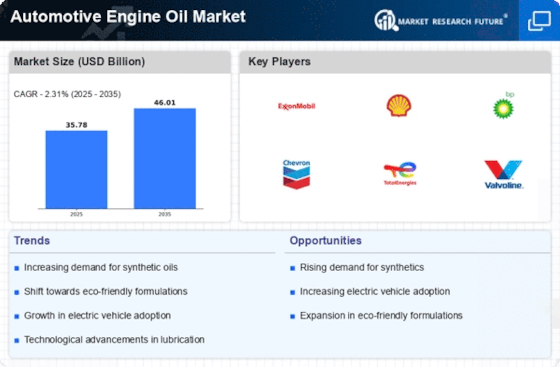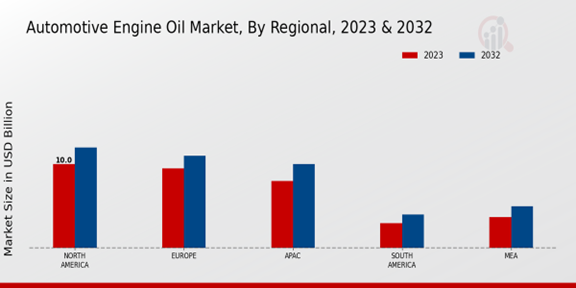Growth of Electric Vehicles
The rise of electric vehicles (EVs) presents both challenges and opportunities for the Global Automotive Engine Oil Market Industry. While traditional engine oils may see a decline in demand due to the shift towards electric mobility, the need for specialized lubricants for EV components is emerging. This transition could lead to the development of new product lines tailored for electric drivetrains, thereby expanding the market scope. As the automotive industry evolves, the demand for innovative lubricants that cater to electric vehicles may offset potential declines in conventional engine oil sales, indicating a transformative phase for the industry.
Increasing Vehicle Production
The Global Automotive Engine Oil Market Industry is poised to benefit from the rising production of vehicles worldwide. As manufacturers ramp up production to meet consumer demand, the need for high-quality engine oils becomes paramount. In 2024, the market is projected to reach 35.8 USD Billion, driven by the increasing number of vehicles on the road. This trend is expected to continue, with the market anticipated to grow as vehicle production increases, particularly in emerging economies. The demand for engine oil is closely linked to vehicle maintenance, suggesting that as more vehicles are produced, the consumption of engine oil will likely rise correspondingly.
Market Trends and Projections
Environmental Regulations and Standards
The Global Automotive Engine Oil Market Industry is significantly impacted by stringent environmental regulations aimed at reducing emissions and promoting sustainability. Governments worldwide are implementing policies that encourage the use of low-viscosity and environmentally friendly engine oils. These regulations are driving manufacturers to innovate and produce oils that meet new standards, thereby increasing the demand for advanced engine oils. As a result, the market is likely to experience growth as consumers and businesses seek compliant products. This regulatory landscape suggests a shift towards more sustainable practices in the automotive sector, further influencing market dynamics.
Rising Awareness of Vehicle Maintenance
Consumer awareness regarding the importance of regular vehicle maintenance is a crucial driver for the Global Automotive Engine Oil Market Industry. As individuals become more informed about the benefits of using quality engine oil, they are more likely to invest in premium products. This trend is particularly evident in regions where vehicle ownership is increasing. The emphasis on maintenance not only prolongs vehicle life but also enhances performance, leading to higher demand for engine oils. Consequently, this growing awareness is expected to support market growth, contributing to a projected CAGR of 2.31% from 2025 to 2035, as consumers prioritize engine care.
Technological Advancements in Engine Oil
Innovations in engine oil formulations are significantly influencing the Global Automotive Engine Oil Market Industry. The introduction of synthetic oils and high-performance lubricants enhances engine efficiency and longevity. These advancements are not only appealing to consumers seeking better performance but also align with stricter environmental regulations. As automakers increasingly adopt advanced technologies, the demand for specialized engine oils is likely to grow. This shift could contribute to the market's expansion, with projections indicating a rise to 46.0 USD Billion by 2035. The continuous development of engine oil technology suggests a dynamic market landscape that adapts to evolving automotive needs.












